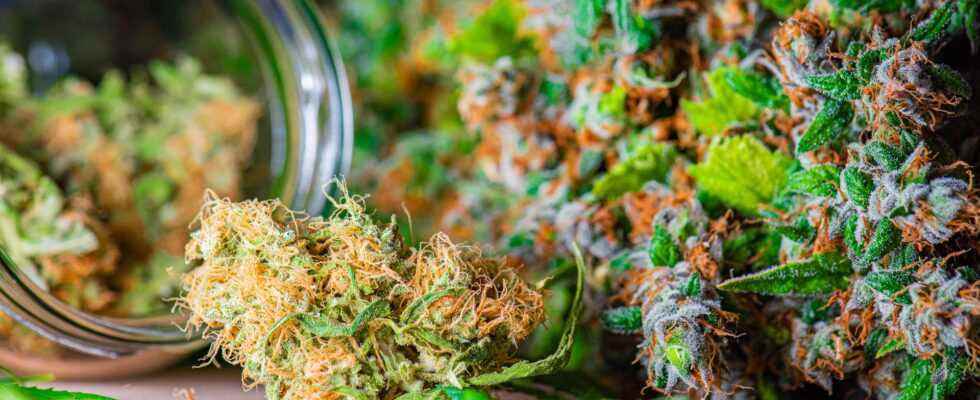The effect on pain is only reasonably well documented in one case: in neuropathic pain, i.e. chronic nerve pain caused, for example, by diabetes, a stroke or spinal cord injuries. They differ from pain signals, which are transmitted via healthy nerves from damaged tissue, such as those caused by a cut. For many other types of pain, such as acute or cancer-related pain, cannabinoids seem to be of little use.
The Cochrane Collaboration, an international network of researchers known for its systematic reviews, concluded in 2018: There is evidence that cannabis relieves neuropathic pain and improves sleep quality more than a placebo. However, there is a lack of good quality scientific evidence to make a safe statement. In addition, side effects may offset the beneficial effects of cannabinoids. Also in a current guideline of the Association of Scientific Medical Societies e. V. (AWMF) for the treatment of neuropathic pain, the use of cannabinoids is not recommended.
How cannabinoids work
When cannabinoids enter the human body, they attach themselves to the receptors of the endocannabinoid system. Type CB1 receptors are mainly found on nerve cells in the brain, CB2 receptors mainly on cells of the immune system and in the digestive tract. They are also found in the skin, bones and lungs. The best-known cannabinoids are delta-9-tetrahydrocannabinol (THC) and cannabidiol (CBD). The intoxicating effect of the drug is based on the former. THC preferentially binds to CB1 receptors in the brain, which are present in large numbers in the limbic system, i.e. in brain regions involved in processing emotions. In addition, THC and CBD influence the release of messenger substances such as serotonin, noradrenaline and glutamate, which contribute to stress and anxiety.
Nevertheless, cannabinoids could be helpful, for example because they make pain more bearable. This in turn ensures less stress and better sleep, which makes everyday life much more worth living. A recent study by cannabis researcher Joshua Aviram and his colleagues at the Technion-Israel Institute of Technology in Haifa, Israel, provided evidence of this. In 2021, the group surveyed more than 1000 chronic pain patients monthly for six months about their condition. During this period, the participants took medicinal hemp in the form of marijuana or as an extract in addition to the conventional painkillers. Although this did not lead to a reduction in pain intensity, two other effects occurred with increasing THC levels: the subjective quality of life increased and the patients needed less painkillers.
Anesthetist Marc Seibolt also confirms this impression: “Cannabis is in many cases a blessing for chronic pain patients who cannot be helped otherwise.” In the outpatient clinic there, he looked after hundreds of people who were given dronabilone for their pain. »The patients sleep better thanks to the THC, it lifts the spirits and counteracts depression. As a result, the pain is less present for them, they can bear it better,” says the specialist, who works as a consulting expert for several pharmaceutical companies that manufacture or distribute cannabis products – including the Sanity Group and the company Demecan.
»The patients sleep better thanks to the THC, it lifts the mood and counteracts depression«(Marc Seibolt, anesthetist)
The fact is, the signaling pathways that cannabinoids act on are involved in a variety of cognitive and emotional processes (see How Do Cannabinoids Work?). In depression, there are changes in the density of cannabinoid receptors in different areas of the brain. In principle, it is therefore plausible that hemp consumption can influence these processes and thus alleviate symptoms. A reduced level of endocannabinoids has been demonstrated in depressed women. As cell biologist Matthew Hill showed in 2008, the lower their concentration in the brain, the longer the low mood lasted. In addition, a high number of CB1 receptors in the frontal limbic area in the brain suggests that cannabinoids may preferentially influence the affective quality of pain, i.e. its evaluation.
Not suitable for people at risk of psychosis, also cannabis damages the lungs
Psychologist Nicola Black and her colleagues from the University of New South Wales in Sydney published a meta-analysis of 84 studies on the use of pharmaceutical cannabis in mental illness in 2019. According to the authors, there is vague evidence for an anxiolytic effect of THC. However, the following applies here: the dose makes the poison. Small amounts of the psychoactive cannabinoid are believed to have a calming effect, while large amounts can even cause anxiety and panic.
